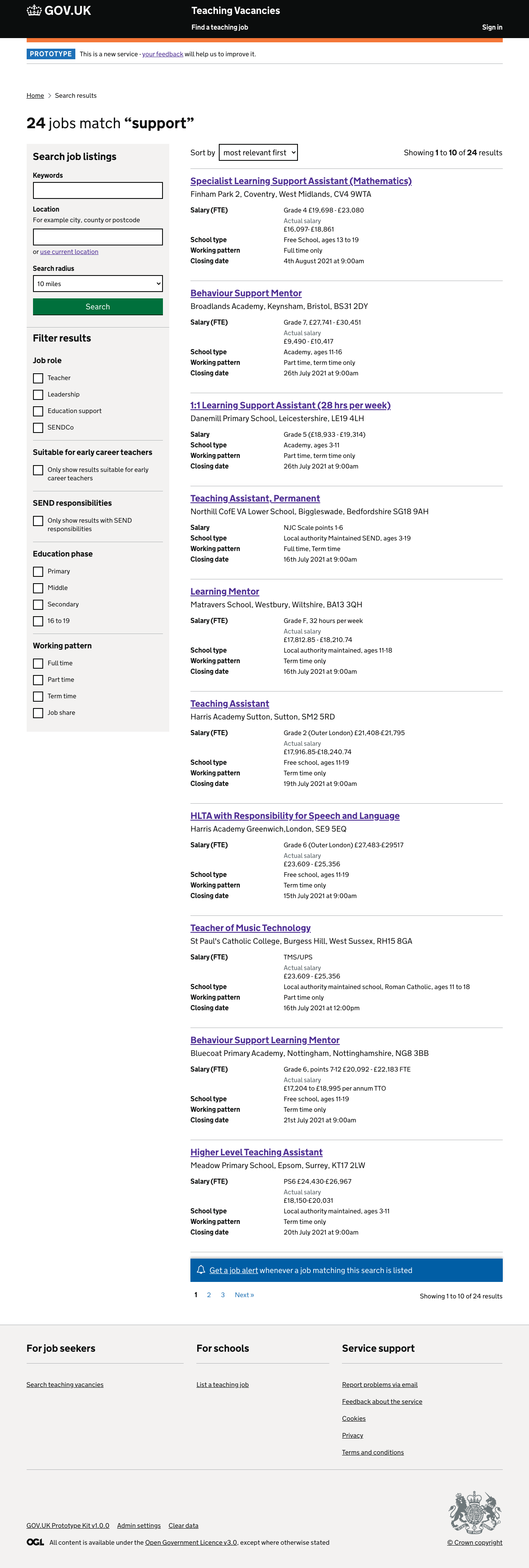Following our first of research with hiring staff, more research was required to better understand how expanding the scope to education support roles would affect job seekers using the service. It was also imperative we validated a number of the assumptions we had gathered from hiring staff about how jobseekers typically search for these types of roles.
# Overarching user need
As a jobseeker looking for an education support role I need a free, trusted educational job listing service with high quality listings so that I can save time and effort when looking for an education support job and more easily find the kind of role I’m looking for.
# Who we tested with
We spoke with 8 jobseekers actively seeking an education support role within a school. Of these jobseekers:
- 2 were seeking a career change to make time for their family.
- 2 were just starting their working career.
- 3 were nearing retirement, having spent a career in education support
- 1 was seeking a job that allowed them to pursue other career aspirations.
# What did we want to learn
- the types of roles jobseekers consider ‘education support’
- how jobseekers search for education support roles.
- what working pattern and contract type job seekers typically look for.
- what makes an education support job advert stand out to job seekers?
- if any changes need to be made to the service to meet the needs of support staff when searching for these roles.
# Hypothesis
We wanted to validate the following assumptions:
- we believe jobseekers looking for support roles will expect to find these roles on Teaching Vacancies.
- we believe education support roles attract local candidates (parents, school alumni and the local community.)
- we believe support staff want to see their actual salary rather than FTE and grade scales.
- we believe support staff expect to see roles that are listed as term time only.
- we believe jobseekers rely on agencies if they are looking for part time work to fit around their studies or other career aspirations.
- we believe the majority of education support staff are parents, seeking a job that fits around their parenting duties.
- we believe the majority of job seekers looking for an education support staff role are not looking to further their career in education.
# What did we test
8 remote 1 hour sessions were carried out using Lookback
A discussion guide was followed to ensure the sessions were consistent.
Task 1: We lead a discussion exploring job seekers current methods for finding a job in education support.
Task 2: We observed job seekers search for a job using the live TV service
Task 3: We observed job seekers as they used the TV prototype where we had implemented changes to the results page based on our previous round of research with hiring staff.

Task 4: We lead a discussion exploring the participants feelings towards using TV to search for jobs
# What did we learn
# Working hours
Working hours make a role attractive. Alongside full time and part time, we added a term time only working pattern. However, for all participants, this did not carry enough information. Working hours can vary (taking into account morning or after school clubs on top of normal school hours.) Job seekers want specificity on the hours or days they are required to work so they can choose a role that they can integrate into their personal lives.
“The working hours are a big thing for me, most TAs are parents”
# Salary
Salary is one of the leading factors that helps job seekers make quick decisions on a job’s appeal. For support staff working term time only contracts, it can be both time consuming and frustrating having to work out actual earnings from the FTE, or grade scale provided. All participants preferred the TVS prototype where they were able to see the actual salary alongside the FTE.
"Salary has been a minefield for me to try and get my head around…I haven’t got a clue”
“That’s much better, where you put the actual salary rather than the grade and pro rata"
# Search patterns
Those new to the profession aren’t always sure what they are looking for so keep their search open to browse all opportunities. Being able to quickly assess whether they qualify for the role and whether there were potential opportunities for professional development was important to these job seekers during their search.
“I have a rough idea of where I want to be, but not exactly so i’d want to look at everything”
# Location
Support staff typically search by location first, often leaving the keywords blank to keep their options open and see what is available in their area.
# Filters
We added the filter ‘education support’ to the results page. Although the majority placed themselves within this category some still wanted to see a separate option for Teaching Assistants. Participants felt ‘education support’ included roles such as 1:1 mentor and pastoral support.
Users did not naturally reach for the filters to refine their search and were not clear about what some of the filters meant (leadership and NQT) and how the job roles were categorised (particularly where job titles were applicable to a number of filters.) For example, some used the filter SEN specialist rather than education support, with the expectation that this would include TA, SENCo and other support roles.
“I like the filters but I do believe teaching assistants should have its own box…it will make it much easier to search"
“Education support…i’d have put that in with the SEN”
# Distinction between roles
It is important to make a distinction between TAs and other support staff.
a) TAs feel misrepresented and undervalued when placed amongst some school roles.
b) There is a clear distinction between a TA and other classroom roles , 1:1 / mentor roles and other support staff (lunchtime staff etc.)
“It makes you feel very undervalued, as a TA we do masses of work and schools couldn’t survive without school staff…to be tagged on with people who do an hour on the lunchtime… I think in a way it undermines what job teaching assistants do”
# Exposure to Teaching Vacancies
Support staff expect to find all school roles on Teaching Vacancies but need more exposure to the service.
# Tags
We included job role tags under the title of each advert. Our hypothesis was that this would help jobseekers quickly identify the job role, especially if the title wasn’t very helpful. At a glance, the tags gave users some understanding of what the job involved, however, It was unclear whether they made the connection between the tags and job role filters. There was some confusion as to why certain tags had been given to some of the roles listed, highlighting that it could potentially be misleading for jobseekers If hiring staff were to incorrectly label roles. As a result we decided to remove these tags entirely.

# Next steps
# Release the scope expansion MVP
Once the scope expansion MVP is live, we will continue to monitor the support roles being listed on the service, respond to feedback and observe patterns and behaviours of both hiring staff and job seekers as they start to use Teaching Vacancies to list education support roles.
# More research with hiring staff
Conduct another round of research with hiring staff to test the scope expansion MVP and iterations to the listing journey.